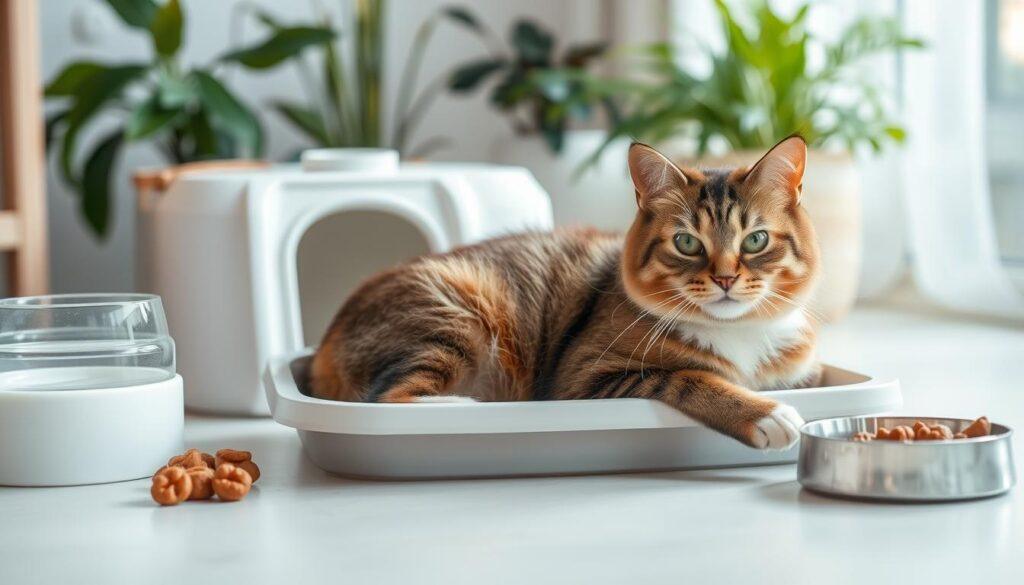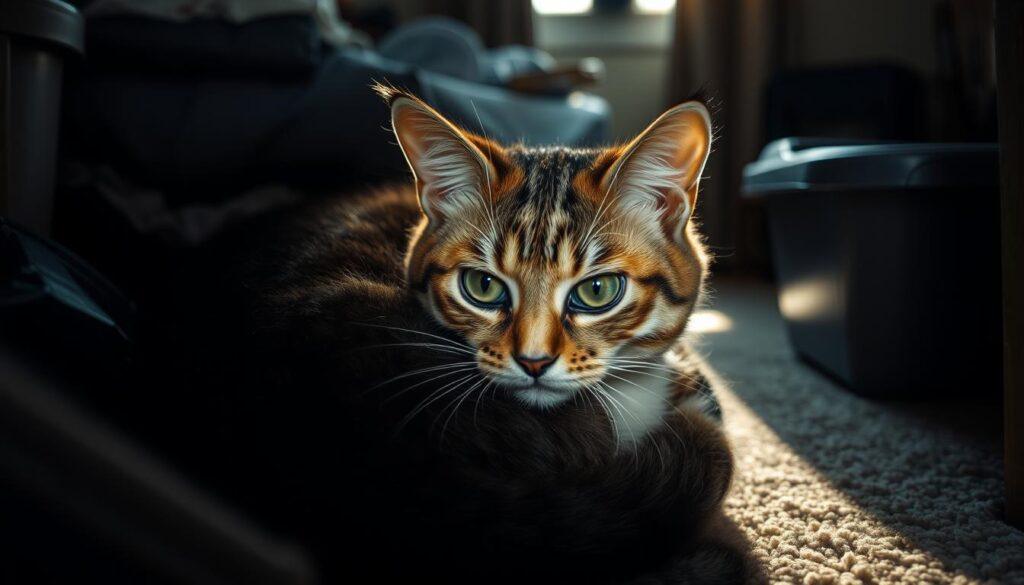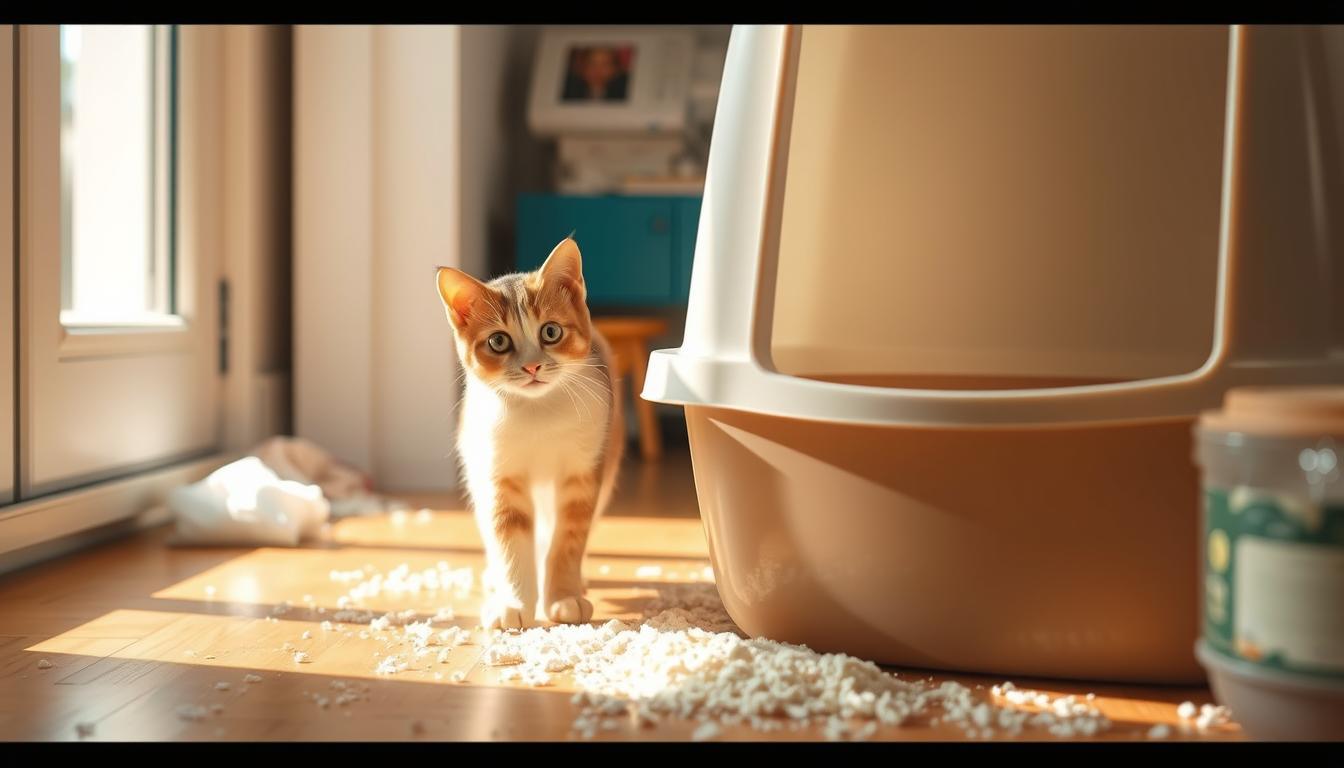It can be frustrating when your cat stops using the litter box. This is called inappropriate urination or feline house soiling. It might be due to health issues or stress in their environment. About 90% of cats might miss the litter box by a few inches1.
To solve this problem, finding the cause is key. Then, you can take the right steps to fix it.
First, check if your cat is healthy. Health problems like diabetes or kidney issues can cause this behavior1. Other reasons include urinary tract infections or bladder stones2. If your cat is acting strangely, see a vet. They can do tests to find out what’s wrong2.
If your cat is healthy, look at their litter box. Cats need litter boxes that are big enough for them1. Some cats don’t like certain litters, which can make them avoid the box1. Try bigger boxes or different litters to see what works best for your cat1.
Key Takeaways:
- Inappropriate urination in cats can be caused by health issues, environmental stressors, or litter box preferences.
- Consult with your veterinarian to rule out potential health problems.
- Ensure the litter box is the appropriate size for your cat and experiment with different types of litter.
- Address any environmental stressors or changes in the home that may be causing your cat anxiety.
- Be patient and consistent when retraining your cat to use the litter box properly.
Health Issues That Can Cause Litter Box Problems
When a cat misses the litter box, health issues might be the reason. Cats with diabetes, early kidney failure, or other health problems often have litter box issues3. A vet can check for any health problems affecting your cat’s litter box habits.

Urinary Tract Infections
UTIs can make urination painful for cats. This discomfort may cause them to avoid the litter box. Look for signs like frequent urination, straining, crying while urinating, and blood in the urine. Quick vet care is key to treating UTIs and fixing litter box avoidance.
Crystals or Stones in the Urine
Crystals or stones in the urine can be very painful for cats. They can irritate the bladder and urethra, making it hard to urinate. If your cat is straining, producing little urine, or seems in pain, see a vet fast. Your vet can diagnose and treat the issue, possibly with diet changes, medication, or surgery.
Kidney Disease and Diabetes
Kidney disease and diabetes can make cats urinate more often. This can lead to accidents outside the litter box. Regular vet visits can catch these diseases early, helping manage them and reduce litter box issues.
Arthritis and Mobility Issues
Older cats may have arthritis or mobility problems. These can make using the litter box painful4. Cats with mobility issues might need a step or ramp to reach the litter box4. Keeping the litter box easy to get to can help your aging or disabled cat use it correctly.
Managing litter box problems in older cats often involves vet care, environmental changes, and patience. Working with your vet and adjusting the litter box setup can greatly improve your senior cat’s life and keep your home peaceful.
Stress and Anxiety as a Culprit
Stress and anxiety can make cats pee outside the litter box. In the past, people didn’t understand stress in cats much. But now, thanks to more education, pet owners know how stress affects cats5.

Stress in cats can be hard to spot. It might show as more hiding, less eating, or odd litter box use5. How well a cat handles stress depends on its genes and upbringing. So, making a calm home and adding fun activities can help5.
Changes in the Home Environment
Big changes at home, like moving or getting a new baby, can stress cats out. Cats like routine and might not adjust well to new things. This can lead to them avoiding the litter box or spraying6.
Introduction of New Pets
Getting a new pet, especially another cat, can upset the balance. The existing cat might feel threatened and start spraying or peeing outside the box. Slow introductions and separate spaces can help5.
Conflicts with Other Cats in the Household
In homes with more than one cat, fights can make some cats too scared to use the litter box. This can cause them to pee elsewhere. It’s key to have enough litter boxes and keep them clean6.
| Stressor | Potential Impact on Litter Box Use |
|---|---|
| Changes in the Home Environment | Litter box avoidance, spraying behavior |
| Introduction of New Pets | Territorial marking, litter box avoidance |
| Conflicts with Other Cats | Feeling unsafe using the litter box, inappropriate elimination |
To help stressed cats, we need to make their environment calm and fun. We should give them plenty of resources and solve any fights. Ideas include making vet visits better, keeping litter boxes clean, socializing them, and playing with them5. Sometimes, doctors might prescribe medicine to help with spraying6.
why does my cat miss the litter box
Several things can make your cat miss the litter box. The size and where you put the litter box are key. They should be big enough for your cat and in a quiet spot7. If you have more than one cat, you’ll need more litter boxes89.
Litter Box Size and Placement
Some cats like open-topped litter boxes, while others prefer covered ones. Think about what your cat likes. The litter box’s spot is also important. It should be quiet, private, and easy to get to. Don’t put it where it’s busy or noisy.
Type of Litter and Cleanliness
The litter you choose can affect your cat’s habits. Most cats like unscented, clumping litter that’s cleaned daily7. Some cats are picky about litter type or texture8. Try different litters, like arm & hammer litter deodorizing, to see what they like. Keeping the litter box clean is also key, as cats are clean animals9.
| Litter Type | Pros | Cons |
|---|---|---|
| Clumping Clay | Easy to scoop, forms tight clumps | Can be dusty, heavy |
| Non-Clumping Clay | Inexpensive, low dust | Needs frequent changing, harder to scoop |
| Silica Gel Crystals | Highly absorbent, low maintenance | Expensive, some cats dislike texture |
| Natural (Corn, Wheat, Pine) | Eco-friendly, biodegradable | Can be more expensive, some have strong scents |
Accessibility Issues for Senior or Disabled Cats
Senior or disabled cats might need litter boxes with lower sides or steps. Medical problems, like arthritis or urinary infections, can also make them avoid the litter box8. If your cat is having trouble, talk to your vet. They can check for health issues and suggest solutions, like a litter box with lower sides or a ramp.
Cats may avoid the litter tray if it’s not clean or smells bad7.
By fixing these issues and following purina litter training tips, you can help your cat use the litter box right. This keeps your home clean and healthy for both you and your cat.
Addressing Inappropriate Elimination Behaviors
When your cat misses the litter box, it’s frustrating and worrying. But, with the right veterinary cat behavior consultation and approach, you can fix it. The ASPCA says about 10% of cats face these issues at some point10.
Consulting with Your Veterinarian
Start by talking to your vet. They can check for health problems like urinary tract infections. These can hurt while urinating and cause cats to go outside the box11. Your vet can also suggest indoor cat litter solutions and how to change your cat’s behavior.
Making Necessary Litter Box Adjustments
Changing your cat’s litter box setup can solve the problem. Here are some tips:
- Get litter boxes that are at least one and a half times your cat’s size, especially for older cats10.
- Have one litter box for each cat, and don’t put them next to each other10.
- Try different litters to see what your cat likes, as they often prefer loose, sandy stuff11.
- Keep the litter boxes clean by removing waste daily, washing with mild soap, and changing the litter monthly10.
Cleaning Soiled Areas Thoroughly
Cleaning soiled spots well is key to stop your cat from going back to them11. Use an enzymatic cleaner to get rid of pet smells. For carpet stains, a three-step clean is best: mild detergent, club soda, and a special urine remover10. Add white vinegar to laundry to get rid of urine smells and stop your cat from going back to the same spots10.
Positive Reinforcement and Retraining
Don’t punish your cat for going outside the litter box. It makes them scared and can make things worse11. Instead, use positive reinforcement and teach them again. Praise them when they use the litter box right. Try Comfort Zone® Calming Diffusers to reduce stress and urine marking10. Cat Attract® litter can also help, as it’s designed to attract cats back to the box10.
Remember, cats don’t go outside the litter box to spite you. It’s usually because of something they don’t understand11.
Work with your vet, adjust the litter box, clean well, and use positive methods. This way, you can help your cat stop going outside the litter box and make your home peaceful again.
Conclusion
Dealing with a cat missing the litter box can be frustrating for both the cat and the owner. Understanding the reasons behind this issue is key. Factors like health problems, stress, anxiety, and the wrong litter box setup can cause it12.
It’s important to check with your vet to rule out health issues like urinary tract infections or kidney disease1213. Adjusting the litter box to the right size and location can help a lot1213. Also, using a litter type your cat likes is crucial1213.
It’s not just about the litter box. Your cat’s emotional health matters too. Stress and anxiety from changes or new pets can cause them to avoid the litter box1213. Providing a safe and stimulating environment can help12.
When accidents happen, clean the area well with enzymatic cleaners. This stops your cat from going back to the same spot12. Rewarding your cat for using the litter box and training them can help12. With patience and the right approach, you can fix cat litter box issues and keep your home happy and healthy.
FAQ
What should I do if my cat starts missing the litter box?
Can stress and anxiety cause my cat to miss the litter box?
What size litter box should I provide for my cat?
How often should I clean my cat’s litter box?
What should I do if my cat continues to miss the litter box after making adjustments?
Source Links
- Litter Box Misses – When Your Cat Goes Right Next to the Box – https://cattledogpublishing.com/blog/litter-box-misses-when-your-cat-goes-right-next-to-the-box/?srsltid=AfmBOopSio26KEcqhLw77tPe_vd1EsRbhNgzv4jADGBPq11o0Eiq6LcV
- When your cat “misses” the litter box – Just Cats Clinic – https://justcatsclinic.com/when-your-cat-misses-the-litter-box/
- Litter Box Misses – When Your Cat Goes Right Next to the Box – https://cattledogpublishing.com/blog/litter-box-misses-when-your-cat-goes-right-next-to-the-box/?srsltid=AfmBOoqdrpvLNdVJ7EgI3ebcAmL6g5bpmAE8uKY6W3HBxsR-bmL7j2qD
- Why does my cat keep missing the litter box and peeing over the side? – https://www.thecatvet.co.uk/why-does-my-cat-keep-missing-the-litter-box-and-peeing-over-the-side.html
- Cat Health | Is Your Cat Stressed Out? – https://catbehaviorassociates.com/is-your-cat-stressed-out/
- Pets on Broadway – https://petsonbroadway.com/blogs/expert-advice/why-isn-t-my-cat-using-the-litter-box
- My cat started to miss her litter tray…what can I do? | Rushcliffe Veterinary – http://www.rushcliffevets.co.uk/blog/my-cat-has-started-to-miss-her-litter-tray-what-can-i-do/
- Why Is My Cat Missing the Litter Box? 11 Vet Reviewed Reasons & Advice – Catster – https://www.catster.com/cat-behavior/why-is-my-cat-missing-the-litter-box/
- 5 Reasons Why Your Cat is Missing the Litter Box – https://www.toe-beans.com/blogs/pet-blog/cat-missing-litter-box?srsltid=AfmBOopt_rB1ZsyBitZubLnSc_fiFeOZXJJi-qeJ4C3T-vzviGEvcJKo
- Your Guide to Solving Inappropriate Elimination | Dr. Elsey’s – https://www.drelseys.com/2020/08/17/your-guide-to-solving-inappropriate-elimination/
- Solving Litter Box Problems – Dumb Friends League – https://www.ddfl.org/resources/solving-litter-box-problems/
- Frederick Cat Vet, Solving Litter Box Problems – https://www.frederickcatvet.com/CatStopUsingtheLitterBox.html
- Why Is My Cat Missing the Litter Box? 13 Vet-Reviewed Reasons & What to Do | Hepper – https://www.hepper.com/why-is-my-cat-missing-the-litter-box/

